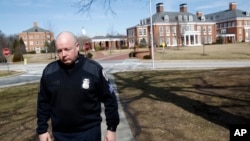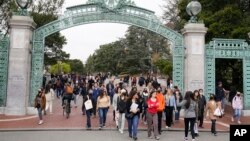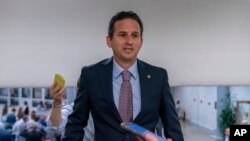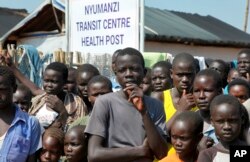Student Union
- By Ayen Bior
Students Offer Ideas to Solve South Sudan Conflict

But some college students in Washington who study conflict resolution suggest other approaches.
“I think we sometimes think of change as something that is radical, something that transforms society in a way that is unimaginable," said Sandra Tombe, a South Sudanese-American working on her doctoral degree. "But change happens on a very small level, and so if we each take the responsibility individually to contribute to society and to contribute to resolving the conflict in South Sudan, then we can actually achieve something."
Although hopeful, Tombe says she is not naive and knows that achieving long-term change in South Sudan could take time. She doesn't expect change "overnight," she said.
"But it is something that on a daily basis we have to be working on.”
Tombe describes herself as ambitious and hard-working. She's 25 years old and her studies at George Mason University focus on conflict resolution, which she says she hopes to use in South Sudan.
Since independence in 2011 from Sudan, "South Sudan has struggled with good governance and nation building and has attempted to control rebel militia groups operating in its territory," according to the CIA World Factbook. "Economic conditions have deteriorated since ... the government ... shut down oil production following bilateral disagreements with Sudan.
"In December 2013, conflict between government and opposition forces led to a humanitarian crisis with millions of South Sudanese displaced and food insecure," the Factbook said. "The warring parties signed a peace agreement in 2015 ... but its formation has been delayed as of late 2016."
Luxing Jiang, 23 and studying at American University, says policy makers and diplomats have taken the wrong approach in South Sudan. Jiang told VOA the international community should focus more on building the country’s infrastructure to create an atmosphere where democracy and civic engagement could flourish.
“I am a realist, so again I think human rights and the political campaigns are important, "Jiang said. "But I think what is more important is how many schools you have, how many hospitals you have, and how many South Sudanese can ... make money ... have a family ... let their children go to school."
But for other students like Dau Dol Dol, the conflict is much more personal. The South Sudanese junior at American University's School of International Studies says that for countless young people like him, all they have ever known is war.
"I am 21 years old and all I have known is the war," said Dol. "How do we change that? We have to change the cycle, the warrior like mentality that we have in South Sudan. We are tearing our own house apart. We have to change something. Something has to change because there are absolutely no words to describe it because we were so full of joy.”
“We have a role to play as students and as people who are hoping to step into leadership roles," Tombe said.
The United Nations and the government of South Sudan declared famine in parts of the country last week. Aid workers complained that delivering lifesaving aid to displaced communities has proven difficult under deadly security conditions as well as a lack of roads for easy accessibility. The South Sudanese government says it plans to initiate a national dialogue designed to end hostilities and bring divided communities to the table.
This story first appeared in VOANews.com. Please leave a comment here, and visit us on Facebook, Twitter, Instagram and LinkedIn, thanks!
See all News Updates of the Day
Universities in Middle East building research relationships with China

As China bolsters research relationships with universities in the Middle East, the United States has taken notice – especially when that research involves artificial intelligence.
Reporting for University World News, Yojana Sharma has the story. (March 2024)
Tips for staying safe while studying in the US

Recent news events have raised safety concerns among some international students studying in the United States.
Adarsh Khandelwal, writing in the India Times, has tips for staying safe from the moment you arrive until the day you complete your studies. (March 2024)
Some colleges are making digital literacy classes mandatory

A 2019 study by Stanford found that most college students can’t tell the difference between real and fake news articles. Amid rampant online disinformation, and the threat of AI-generated images, some schools are making students learn “digital literacy” to graduate.
Lauren Coffeey reports for Inside Higher Ed. (March 2024)
With federal student aid delays, students aren’t sure what college will cost

The U.S. Department of Education’s federal student aid form (FAFSA) experienced serious glitches and delays this year.
Now, many students have been admitted to college, but don’t know how much money they’ll need to attend.
Read the story from Susan Svrluga and Danielle Douglas-Gabriel for The Washington Post. (March 2024)
Senator draws attention to universities that haven’t returned remains

More than 70 U.S. universities continue to hold human remains taken from Native American burial sites, although those remains were supposed to be returned 30 years ago.
Jennifer Bendery writes in Huffington Post that one senator has been using his position in an attempt to shame universities into returning remains and artifacts. (April 2024)







